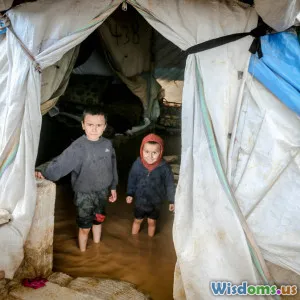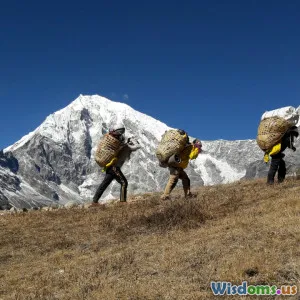
How Teaching English in Nepal Opened Doors for Rural Children and Me
7 min read Discover how teaching English in Nepal transformed rural children's lives and opened new horizons for me. (0 Reviews)
How Teaching English in Nepal Opened Doors for Rural Children and Me
Introduction
Venturing into the heartlands of Nepal with just a suitcase and a passion to teach, I was unaware that this journey would transform not only the lives of children in remote villages but also reshape my entire perspective on education and opportunity. Teaching English in rural Nepal is not merely about grammar or vocabulary; it’s about igniting hope, bridging divides, and opening doors to unimaginable possibilities. In this article, I share firsthand experiences and explore why language education is a key to unlocking brighter futures both for Nepal’s children and for educators willing to step outside their comfort zones.
The Landscape of Education in Rural Nepal
Challenges Faced by Rural Students
Nepal has made significant strides in education, with literacy rates rising to over 67% nationally, but rural regions still face daunting barriers. Many villages are nestled in mountains where schools struggle with inadequate resources, lack of qualified teachers, and limited access to modern educational materials. According to UNESCO, the dropout rate in rural Nepal can exceed 30% by secondary school, often due to economic necessity or the perception that education does not promise viable futures.
English, being a global lingua franca, carries special importance. Yet, proficiency remains low in rural areas because of insufficient teaching infrastructure.
Why English Matters
In Nepal, English is more than a subject; it’s a bridge to higher education, employment, and migration opportunities. Proficiency can elevate economic prospects since the tourism sector, international NGOs, and educational institutions require English speakers. UNICEF reports that students who achieve basic English skills are 35% more likely to pursue higher education or vocational training.
By teaching English, educators provide rural kids not only language skills but a key to wider engagement in Nepal’s evolving economy and beyond its borders.
My Journey: From Volunteer Teacher to Lifelong Learner
First Impressions and Cultural Challenges
After arriving in a small village near the Annapurna range, I quickly realized teaching English meant adapting to contexts far different from urban classrooms. Electricity was unreliable, and textbooks were scarce. The students were eager but shy, many of them first-generation learners.
Initially, reliance on traditional teaching methods didn’t connect well with the children. So I switched gears—incorporating songs, storytelling, and local examples into lessons. For instance, we transformed simple vocabulary into stories about daily village life, making the language tangible and relevant.
Building Trust and Seeing Progress
Over months, something remarkable began: students who once hesitated to speak slowly found joy in using English names, simple greetings, and eventually complex sentences. One memorable moment was when a quiet girl read out loud confidently, breaking her own learning barriers. Her parents later told me English skills helped her win a scholarship for higher studies.
Engaging parents in the educational process was also crucial; they became allies in encouraging children to persist despite economic pressures to work.
Broader Impact: Doors Opened by English Education
Educational Opportunities
With enhanced English ability, many students gained confidence to attend secondary schools farther away, apply for scholarships in Kathmandu, or enroll in vocational courses. English blogs published by local teachers show stories of former rural students now working in NGOs, teaching assistants, and translators.
Economic and Social Impacts
English skills can translate directly into improved income. Stories from NGOs reflected how young adults fluent in English booked tourism services, negotiated contracts, and accessed information that empowered their village to improve infrastructure.
Socially, learning English diminished feelings of isolation for children who felt sidelined in national conversations. It instilled a sense of global belonging without erasing their rich cultural identity.
The Personal Transformative Effect
Teaching in Nepal challenged my assumptions about education and poverty. It honed my creativity, patience, and cross-cultural communication. More profoundly, it cemented a conviction that education is a powerful tool for social change—not just a means but an end in achieving equity.
Conclusion: Empowerment Through Language and Shared Humanity
Teaching English in rural Nepal was more than a volunteering chapter; it was a reciprocal journey of empowerment. For the children, it opened gateways to knowledge, self-confidence, and future prospects otherwise inaccessible. For me, it broadened understanding, enriched empathy, and deepened commitment to education as a universal right.
If you are seeking a meaningful experience that transcends borders, teaching English in underserved communities like rural Nepal offers a unique opportunity to transform lives—including your own. Education opens doors, but it is the courage to step through those doors that sparks genuine change.
References
- UNESCO Education Reports, Nepal 2021
- UNICEF Nepal Education Statistics
- Local NGO reports and testimonials
This story is inspired by a compilation of volunteer experiences and educational research emphasizing the transformative power of teaching English in rural Nepal.
Rate the Post
User Reviews
Popular Posts





















